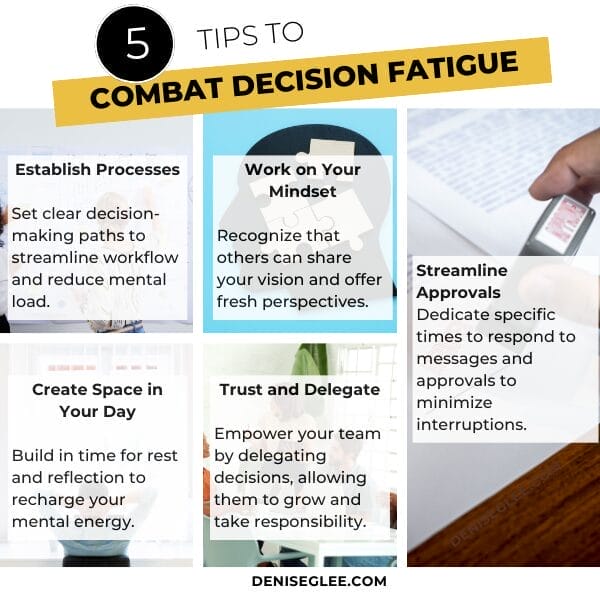
How to Manage Decision Fatigue as a Business Owner
- Author: Julia Evans
Life as a business owner is undoubtedly tough. No matter the level of belief you have in your product or service, you’ve still got to fight to convince others, as well as actually getting it out to your customers. There will be highs and lows, and each day will likely bring something unexpected as your business grows. This sounds hard, but it’s not all bad – there will be moments of joy, excitement and achievement that make everything worthwhile.
One of the challenges of being the person in charge, particularly at the start, is that you’ll have multiple decisions to make every day. Every part of the business will report to you, and you’ll probably want to be heavily involved in order to make sure the product is actually representative of your vision. But none of us are robots. Constantly feeling accountable and needing to make decisions is exhausting, and can lead founders towards burnout. Yet without decisions being made, the company won’t move forward. So what’s the answer?
In this post, we explore the signs that you might be experiencing decision fatigue, as well as sharing tips on what you can do about it.
Recognizing Decision Fatigue: Symptoms to Watch For

Decision fatigue can present itself in a multitude of ways depending on your personality. You might find that you’re more irritable and have less patience than usual, or constantly feel drained and tired. When you have to make decisions, you might be more hasty, trying to get the issue out of the way rather than giving it proper consideration. Alternatively, you might get hyper-focused and be unable to make a choice at all. Some people find that they procrastinate, taking far longer than usual with their tasks because they keep putting them off.
If these traits sound familiar, then you could be inching towards decision fatigue. The image below captures some key tips to manage this fatigue, but let’s delve deeper into each one for a better understanding.

Establish Effective Processes

Processes should be the backbone of any business, big or small. Think of them as the framework that supports your operations and decision-making. When you have an established decision-making path to follow, your brain doesn’t have to work as hard.
Instead of bogging yourself down in the nitty-gritty details of every decision, lean on data and insights from past experiences. This reliance on established processes streamlines your workflow, enabling you to operate with greater efficiency and clarity.
Imagine you’re faced with a decision that feels overwhelming. You could sift through a mountain of options, each with its own set of consequences, or you could refer back to a well-documented process that outlines how to handle similar situations. By following that established path, you can sidestep the mental fatigue that often accompanies constant decision-making. It’s like having a roadmap in a maze—suddenly, the journey feels less daunting, and you can focus your energy on navigating the twists and turns rather than figuring out which direction to go.
Work on building your own confidence in the team and ability to put boundaries in place to give yourself space to rest. Your brain needs a break in order to come back stronger, and you need to recognize that the team should be able to function without you.
Julia Evans
Building Confidence through Structure
But the benefits of having these processes extend beyond just lightening your cognitive load; they also instill a sense of confidence. When you have a structured approach to decision-making, you’re anchored in the values you set for yourself during calmer moments. This consistency is crucial in the turbulent world of business, where emotions can easily run high. You can trust that your decisions are grounded in your core principles rather than swayed by the stress of the moment.
Ultimately, processes help maintain a clear vision of what your business stands for. They enable you to communicate expectations effectively to your team, ensuring everyone is on the same page. When each team member understands the processes in place, they can operate with a sense of autonomy, empowered to make decisions that align with your shared goals.
As your business scales, these processes mean that team members don’t need to come to you for every little check-in. They can confidently follow the established steps you’ve set out, which frees up your time and reduces interruptions. Moreover, having clear processes speeds up the onboarding of new starters, giving them a solid foundation to work from right from the beginning. To maximize efficiency, ensure you have proper documentation of processes from start to finish and leverage technology to reduce manual tasks wherever possible.
In essence, building a strong backbone of processes is essential for your business. Not only does it help you navigate the complexities of decision-making, but it also empowers your team to thrive, all while keeping you grounded in your vision.
Optimize Your Approval Workflow

Context switching between different tasks and conversations is one of the least effective ways to achieve flow and work well. Research has shown that interruptions (for example, message notifications whilst completing another task) increase frustration and stress after just 20 minutes. Yet as a business owner, this is something that you likely experience all the time.
Instead of replying to messages as and when they pop up, dedicate some time to this task at the end of the day. You can block some time to read and reply, or ask your team to add everything that needs approval into a shared document for you to review each day. Of course, some things may be more urgent, in which case you will have to context switch. But by streamlining those small everyday decisions, you can take back some control and give your brain room to focus.
Empower Your Team Through Delegation
As a business owner, it’s natural to feel protective over your product. It’s your idea, and you want to make sure you and the team are doing everything you can to make it a success. However, as your offering grows, it’s no longer practical to assume you’ll be able to oversee every decision. The big sign offs should still come your way, but you need to build a team you can trust to take the lead in their own specialist areas. That way, you can delegate the first round of decision-making to them, leaving only the biggest issues to land on your desk.
If you’re struggling with this, remember that delegating to your team gives them room to grow and flourish (here’s more information on how to delegate well). If you hold on to everything, they’ll struggle to get the experience they need – a potentially catastrophic issue if you’re suddenly off sick, or just even want to take some holiday. By delegating, you’re giving them room to take responsibility with you as a safety net if they need it.
Cultivate a Growth-Oriented Mindset

Sometimes, we take on extra responsibility and hold onto decision making power because we’re afraid of what will happen if we let go. You may feel that no one has the same vision for the company as you, or the capabilities to take the lead. But this often isn’t true, and besides, a fresh perspective is also a good thing for any business. Your way isn’t (and shouldn’t) be the only way – other people have something unique to offer that might just be better.
Work on building your own confidence in the team and ability to put boundaries in place to give yourself space to rest. Your brain needs a break in order to come back stronger, and you need to recognize that the team should be able to function without you. A good leader should empower their team and give them the tools they need whether they’re there or not, so if you don’t feel this is the case, then this is an area to work on. A healing and leadership coach like Denise G. Lee can help with this, as well as being a great sounding board, if you need external support.
Prioritize Mental Space in Your Daily Routine

Decision making is all part and parcel of being a business owner, but it can be tiring and overwhelming. By following these tips, sharing out the responsibility where you can and building in stress-free brain space for yourself, you can reduce the negative impact this has on you (and your team).
Julia Evans
Julia is passionate about supporting women in business to streamline their productivity and achieve their career goals. Through her own self-development, she has learned to appreciate the intricacies of different personality types, and understand the importance of both introverted and extroverted attributes in the workplace.





